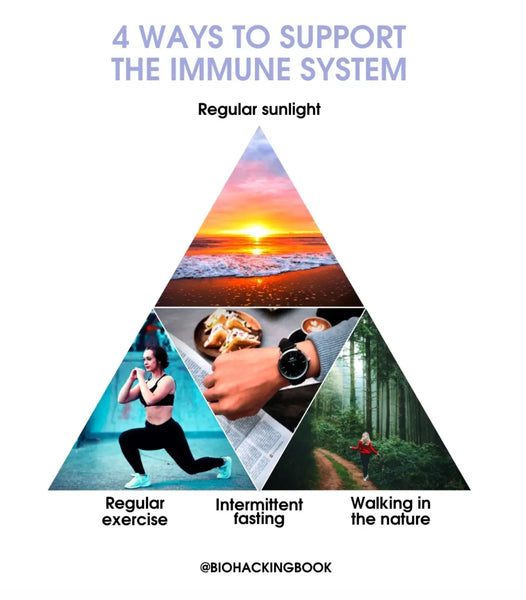A well-functioning immune system is a reflection of the total state of health of the body. A healthy person is an ecosystem of different life-forms that live in balance with each other and the environment. An epidemic can indeed be an opportunity to review your lifestyle and find ways to not only enhance your overall wellbeing but also your resilience to illness. We deep-dived into existing research on immunity and collected the best tips for enhancing immunity here:
ENJOY REGULAR SUNLIGHT
The most bioavailable source of vitamin D is the sun. You should get daily sunlight exposure as often as you can, but avoid getting burnt. The best time for sunlight is in the morning to help in balancing the circadian rhythm, which also affects the function of the immune system. The immune system has its circadian clocks, and when disturbed, the immune system also is disrupted.
OPTIMIZE SLEEP
The body repairs itself primarily in deep sleep, and sufficient sleep is extremely important for the healthy functioning of the immune system. Infection-fighting antibodies and cells are reduced during periods when you don’t get enough sleep. Also, melatonin (the sleep hormone) is a powerful antioxidant that modulates autophagy and deep cell repair during sleep. Melatonin acts also on both the innate and specific responses of the immune system via combined mechanisms that mainly involve the modulation of cytokines and the production of oxidative stress.
REDUCE ELEVATED CORTISOL (i.e., balance stress)
If you are stressed, take enough time off to recover. Chronic stress (physiological and psychological) is one of the major contributors to an unbalanced immune system and predisposition to diseases. Elevated cortisol levels have been noticed in patients with viral infections.
EXERCISE REGULARLY
Exercise ‘flushes’ the lymph system and increases blood circulation. It also stimulates the body’s defense mechanisms and strengthens immunity by activating Nrf2. Regular exercise may reduce the prevalence of upper respiratory infection. However, overtraining will make you more vulnerable to getting sick. If you have a fever and/or you feel very sick, do not exercise.

PRACTICE MODERATE COLD EXPOSURE
It appears that moderate exposure to cold doesn’t increase the susceptibility to infections but instead may enhance resilience against them. As long as you don’t feel uncomfortable or frail from the cold then short-term moderate cold exposure can be beneficial to your immunity and overall health. Just make sure the exposure time to cold or wind does not last too long. Preferably also protect your neck, lungs, and stomach.
GO TO SAUNA REGULARLY
Sweating flushes the body from toxins and infections by improving lymphatic drainage and blood circulation. The heat both in the traditional and infrared sauna may kill pathogens. Regular sauna bathing may also strengthen the immune system: going to sauna over 2 times per week has been shown to reduce the risk of acute and chronic respiratory conditions, at least in middle-aged men.
PRACTICE INTERMITTENT FASTING
Regular intermittent fasting is an effective strategy to build resiliency against pathogens. Time-restricted eating can upregulate glutathione and autophagy to protect against sickness. However, it is important to highlight that IF can be useful for prevention, but it is not effective if you are already infected with a virus.
GET INTO NUTRITIONAL KETOSIS
The ketogenic diet activates the Nrf2 pathway that lowers inflammation and oxidative stress. Being exposed to stress, jet lag, infections, and pollution is safer in a state of ketosis, whether that be with fasting or eating a ketogenic diet because the body is in a heightened state of self-defense. How cool is that!
Read more about immunity and ways of enhancing yours from the Biohacker’s Flu Guide.
How do you naturally enhance your immunity? Share your tips in the comments!





